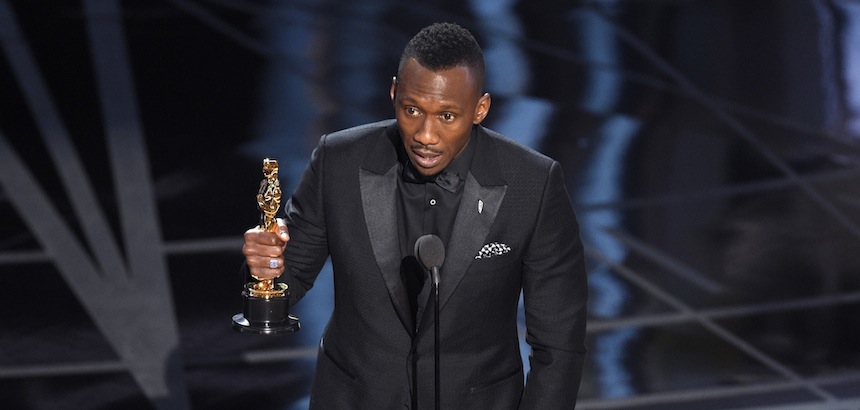Destroy All Monsters: Look to the Movie Stars

It wasn't a particularly political Oscars after all. Hollywood mostly went about the business of giving and receiving Oscars, and the most political moments in the show - the first Muslim-American actor winning; the proxy Best Foreign Language speech thanks to President Trump's travel ban - were the ones we expected.
Still. There is something about this night, and the potential purpose and payoff of celebrity culture, that is worth looking at. This was, after all, the year in which (last-minute envelope snafu notwithstanding) a movie about two gay Black men in love won Best Picture. It was the year when a 7-hour television documentary about the racial history of Los Angeles won Best Doc. It was the year when the aforementioned travel-banned filmmaker won his second Oscar.
This is the community we frequently accuse of being frivolous, flyweight, and shallow?
Sure: a man with very serious assault allegations against him won Best Actor. But Brie Larson, who's had to hand him an acting award twice in 2017 so far, had the courage of her convictions to refuse to celebrate him, even on a stage in front of a (supposed) billion TV watchers.
Sure: a goddamn mess happened at the Best Picture announcement, but a team of white filmmakers immediately handed their trophy off to the winning team with what could be called, with only a couple of exceptions, tact and class.
I'm ready to stand up and say that it's possible that we've all - myself included - been hard on this professional community, and oftentimes unduly dismissive. It might be time to stop.
I spend a lot of time on Twitter and I see a lot of engaged actors (Jeffrey Wright is my favourite) being told repeatedly by anti-fans that they only tune in to those Twitter feeds for, I dunno, actor-related things. Chatter about makeup or something.
Those readers find any political commentary or resistance in an actor's public messaging jarring and unwelcome. "Stay in your lane!" is a frequent cry.
Leaving aside the inherent ludicrousness of that whole idea - given that the people who are shouting "stay in your lane!" at moviestars are, themselves, almost certainly not professional politicians either, and therefore have no more claim to the political lane than any other common Americans - it all seems like a continued effort to delegitimize celebrities as having anything worthwhile or meaningful to say about the culture that they, in large part, help to shape.
In some cases, the hecklers are professional politicians:
Watch celebs spew ignorant political venom at Oscars?? Nah...think I'd rather have a colonoscopy. Both happen from same location.
— Gov. Mike Huckabee (@GovMikeHuckabee) February 26, 2017
More delegitimization. More inherent dismissiveness.
And why? Same reason: they're scared to death of these guys.
I mean, of course they are. In modern America, there are only a few groups of people who hold sway over public opinion. Politicians are certainly one of them; in the last year, arguably, the leading one.
But most of the rest of the time, rightly or wrongly, it's entertainment media at large. You can put journalism in that category if you wish, but either way, you pretty much have no choice but to include the folks who make movies and television, and that team a) leans left and b) has more than enough resources at their disposal to not get dented if the president picks a Twitter fight with them.
They're people who, whether Trump and his associates like it or not, connect with the general public on a pretty much day-by-day, hour-by-hour basis, and not just in movies and television. They're doing it through their social feeds and ad campaigns and yeah, once a year for a month or two, they're doing it through their awards speeches and their overall public presentation of themselves.
It all bears the whiff of preaching to the choir, of course, and maybe America really is large and varied enough that everyone who's a Meryl Streep fan is already against Trump and nothing she says matters.
But... doesn't it? Are they? Popular culture, such as we know it, is as wide and varied as culture itself, but it is also - in some ways - a mass, a collective effect, a tide of ideas that reflects and reinforces the culture that creates it.
Pop culture and celebrity culture create no law and save no lives (at least, not directly), but they tell a large number of people what "normal" is. This year, the definition of "normal" is among the most critical aspects of American life.
It's why it's important to continue to be rigorous around representation and discussions of same in our movies and on television. It's also why it's time to recognize that discounting moviestars as politically unimportant or unsophisticated is another effort in silencing by those who are trying to insert their version of normal upon our own, and for us to call it out accordingly.
Destroy All Monsters is a weekly column on Hollywood and pop culture. Matt Brown is in Toronto and on Letterboxd.







